Economic freedom is the ability and privilege of people
to engage in various social and economic activities without unnecessary
restrictions and prohibitions. Such freedom is guided by voluntary exchange,
open markets, personal choice and accountability, and clearly defined private
property rights.
People are economically free if they can choose to buy or
not buy certain goods and services from various sellers, when they are not
forced and coerced to buy something expensive and/or poor quality. Freedom is
not absolute though and free people have no freedom to harm other people nor
destroy, burn or steal their private properties.
Human rights include the right to life, right to private
property, and right to liberty and security of person. Thus, even a person who
has committed a wrong act should be given due process to defend him/herself
from false or exaggerated accusations. Murders of individuals based on flimsy
or unsubstantiated accusations like what is happening in a number of instances
in the on-going war on drugs are deprivations of those people’s human rights.
Combining these two concepts is very important for people
to live with freedom and dignity.
And these two concepts will be tackled in a big
international conference by the Economic Freedom Network (EFN) Asia on the
theme, “Economic freedom and human rights in business” this coming Nov. 22-23
at Dusit Thani Manila Hotel, Makati City. The conference is jointly organized
by EFN Asia Economic Freedom Network Asia (EFN Asia) and the Friedrich Naumann
Foundation for Freedom (FNF), supported by four local organizations, the
Philippine Commission on Human Rights (CHR), Philippine Economic Society (PES),
Ateneo Human Rights Center (AHRC), and Bloomberg TV Philippines.
Among the key speakers and major resource persons in this
event will be Siegfried Herzog, head of Regional Office, FNF South East and
East Asia; Ms. Rosemarie Edillon, president of PES; Markus Loening, former
German Federal Government Commissioner for Human Rights Policy and Humanitarian
Aid, and Vice-President Leni Robredo.
Other speakers will be Wan Saiful Wan Jan, CEO of the
Institute for Democracy and Economic Affairs (IDEAS), Malaysia; Chito Gascon,
chairperson of CHR; Franz Jessen, ambassador and head of Delegation of the
European Union to the Philippines; Nicholas Sallnow-Smith, chairman of the Lion
Rock Institute, Hong Kong; and Peter Perfecto, executive director of the Makati
Business Club (MBC).
So, how economically free are the people of the
Philippines and big nations of the ASEAN? How free or unfree are they from
heavy regulations that tend to restrict entry into markets and interfere with
the freedom to engage in voluntary exchange?
The Economic Freedom of the World (EFW) 2016 report give
scores to countries (0 most unfree, 10 most free) based on five criteria and
areas: (1) Size of government, (2) Legal system and property rights, (3) Sound
money, (4) Freedom to trade internationally, and (5) Regulations. Then they are
ranked from the most free to the least free economies.
For this short paper, only the performance in Area 5 will
be tackled and in particular, sub-areas on labor regulations and business
regulations.
The Philippines has a modest score in both labor and
business regulations, meaning not yet choked by those multiple bureaucracies
and permits. In particular, the country has a good score in labor hiring
regulations and enforcement of the minimum wage, but it has a low score in
hiring and firing of employees.
From some existing policy debates in the Philippines
today, we can apply the principles of economic freedom and human rights on
these issues.
(1) On labor contracting including endo, being hired for
short-term labor contracting is a privilege, a human right for new job entrants
and the unskilled. It is much better than being rejected and not hired by
employers because of the high cost of hiring new additional workers and the
threat of government harassment for firing the un- or less-experienced, less
skilled people.
(2) On a nationwide minimum wage and abolition of
regional wage disparities, this one-size-fits-all policy will make hiring
people in the provinces become more expensive, and, as a result, there will be
fewer hiring of lesser-skilled, lesser-experienced people. There are now more
machines and robots available that can slowly replace more laborers.
(3) On entrepreneurship, it is a privilege and human
right for the more hard-working, more ambitious people and they should not be
deprived or discouraged to try that route because of heavy government
regulations, bureaucratism, and taxation.
Increased market dynamism and fewer government
regulations and taxation are the keys to ensuring economic freedom and
protection of human rights.
Bienvenido S. Oplas, Jr. is the head of Minimal
Government Thinkers and a SEANET Fellow. Both organizations are members of EFN
Asia.
---------------
BWorld 86, Philippine industrial policy, October 15, 2016


No comments:
Post a Comment